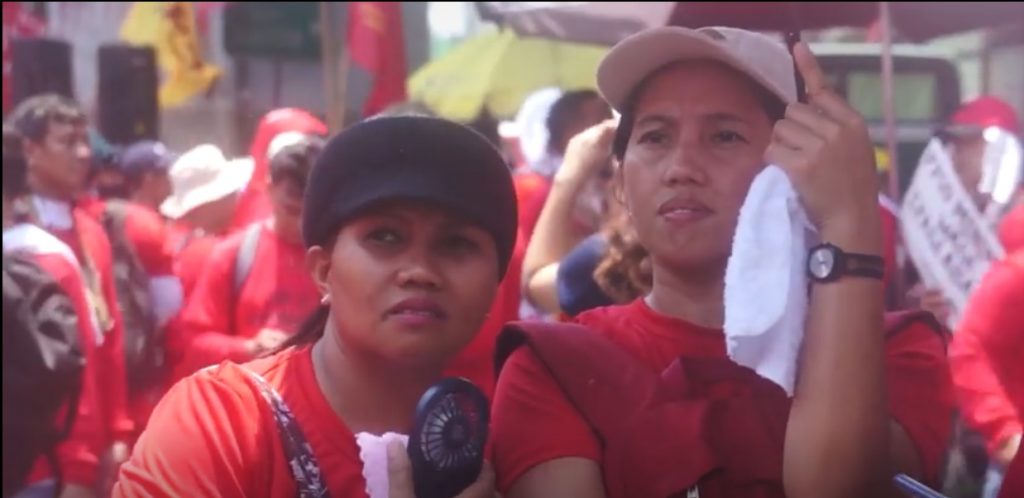“Even a salary of P36,000 is not enough. We have to borrow money to make ends meet. At times, we even have to pawn our ATMs (to loan sharks). My mere daily transportation cost is already pegged at P4,000. How could they dare tell us that about P10,000 is enough?”
By JANESS ANN J. ELLAO
Bulatlat.com
MANILA – Tipid na tipid kami. (We’re living on a tight budget.)
This is how 34-year-old Mary Jane Emplamado described her life as a factory worker and a mother, with her present salary barely enough to cover their needs. She cooks one viand per day, hoping it would last for the entire day.
“It’s really difficult. We try to make ends meet. Out of my meager salary, I still send money to my family back in the province,” she told Bulatlat in Filipino at the sidelines of a big protest here, commemorating the International Labor Day.
This year’s commemoration was participated by many women workers. Women rights groups are not surprised with the turn out, especially amid the incessant price increases, worsening work conditions in the country and threats against those who dare to air dissent.
Thinktank Center for Women’s Resources (CWR) said the appalling working conditions of many Filipino women workers draw a stark contrast to the supposed improvement of women’s economic participation in the Global Gender Gap Index last year.
Citing government data, the CWR said there are 4.7 million women workers in wholesale and retail trade and 1.4 million women work in manufacturing industry. Meanwhile, women who engage in professional and scientific work are only 125,000 or a mere 0.30 percent in the total workforce.
Poverty threshold
Reacting to a recent news on the country’s supposed poverty threshold, nurse Cristine Oginez said that P10,481 is barely enough for one person to live decently, especially in the face of increasing prices.
“Even a salary of P36,000 is not enough. We have to borrow money to make ends meet. At times, we even have to pawn our ATMs (to loan sharks). My mere daily transportation cost is already pegged at P4,000. How could they dare tell us that about P10,000 is enough?” she said.
Rose Deblois, 61, of the National Federation of Employees of Department of Agriculture said the same is true even for government employees, even if they have already received their fourth tranche of salary increase.
First-time protester
First-time May Day protester Nora Cultura, a worker at a thread company in Marikina, said she went to the rally to check on how big the workers’ movement is in the Philippines. She was not at all disappointed with the turnout.
“So this is what Mayo Uno really means. When workers stand together, we can win our fight,” she said.
At the factory, Cultura said workers are subjected to heavy working conditions – standing up at the production line for nearly eight hours per day, and tormented to meet their quotas.
Contrary to government claims that protests keep foreign investors away, Oginez said she has met many foreigners who are in solidarity with their fight for just wage.
“That’s hilarious,” she quipped, adding that these foreigners know that what they are fighting for is just.
For Deblois, she said in Filipino that it is important to note that the welfare of workers must be looked into by the government, adding that even if they are mere “cheap labor” to the eyes of the foreign investors, “at the end of the day, they still need us.”
“The times are different now. What men can do, we, women can do as well. But discrimination still persists. And so we are here to unite and fight,” Deblois said.
Labor vote
This coming elections, nurse Oginez said it is time for Filipinos to decide who to vote for. These people, she added, must have a solid track record of fighting for the rights of the people.
“We must vote for those who have strong stand against Endo,” Cultura said. Endo stands for end of contract, the widespread practice of contractual, temporary and flexible labor arrangements.
When asked for her message for President Duterte, Emplamado said Duterte should heed the calls of the poor. “Killing us is not the answer,” she said, referring to thousands of poor slain in the name of “war on drugs.”
The post A slice of life of Filipino women workers appeared first on Bulatlat.

